 For the last several months, Nathaniel has been running something called Musical of the Month over at The Film Experience. The project's definition is cued by its name and, so far, it's proven to be one of the most reliably gratifying collaborative blog projects I've hit in some time, with each film exceeding my expectations in the best of ways. This month brings a film that has languished as something of a dirty little secret in the hearts of movie fans for some time, one which -- even in the context of a top-tier dvd release -- feels obliged to impose this fascinating disclaimer prior to any viewing. (The dvd I watched even forbade skipping, fast-forwarding or pausing over this disclaimer, just like they do with that FBI warning.) But all disclaiming aside, I'm grateful, at long last, to sit down and consider this film and to do so through the illuminating point of focus provided by...
For the last several months, Nathaniel has been running something called Musical of the Month over at The Film Experience. The project's definition is cued by its name and, so far, it's proven to be one of the most reliably gratifying collaborative blog projects I've hit in some time, with each film exceeding my expectations in the best of ways. This month brings a film that has languished as something of a dirty little secret in the hearts of movie fans for some time, one which -- even in the context of a top-tier dvd release -- feels obliged to impose this fascinating disclaimer prior to any viewing. (The dvd I watched even forbade skipping, fast-forwarding or pausing over this disclaimer, just like they do with that FBI warning.) But all disclaiming aside, I'm grateful, at long last, to sit down and consider this film and to do so through the illuminating point of focus provided by...
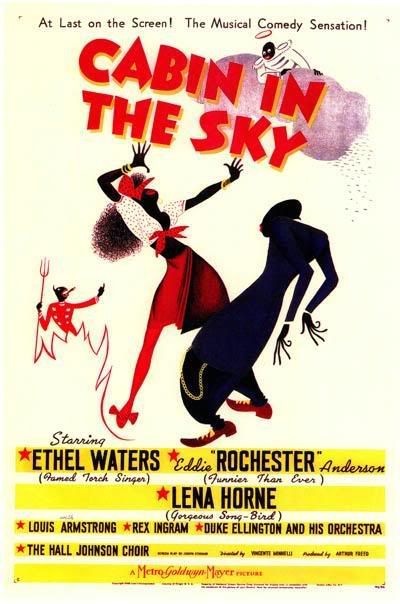
...Lena Horne in Cabin in the Sky (1976)
approximately 13 minutes and 46 seconds
8 scenes
roughly 14% of film's total running time
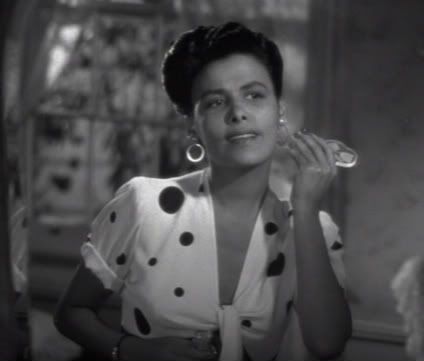 Georgia Brown has an especial connection to Little Joe Jackson (Eddie "Rochester" Anderson in an erratic but ultimately charismatic performance), which the devil's minions hope to exploit. (See, the whole narrative is premised upon a competition between the devil's minions and God's men over whether or not Little Joe will repent his sins, and thus be united for all eternity with his devoted wife, or backslide into a life of liquor, gals and gambling, and be thus separated from her forever.) And Horne's Georgia plays a central role in Lucifer Junior's schemes to acquire Little Joe's everlasting soul.
Georgia Brown has an especial connection to Little Joe Jackson (Eddie "Rochester" Anderson in an erratic but ultimately charismatic performance), which the devil's minions hope to exploit. (See, the whole narrative is premised upon a competition between the devil's minions and God's men over whether or not Little Joe will repent his sins, and thus be united for all eternity with his devoted wife, or backslide into a life of liquor, gals and gambling, and be thus separated from her forever.) And Horne's Georgia plays a central role in Lucifer Junior's schemes to acquire Little Joe's everlasting soul. First, Lucifer Junior sees to it that Georgia learns of Little Joe's sweepstakes win.
First, Lucifer Junior sees to it that Georgia learns of Little Joe's sweepstakes win. Then, he sends Georgia round to Little Joe's place to give him the news.
Then, he sends Georgia round to Little Joe's place to give him the news.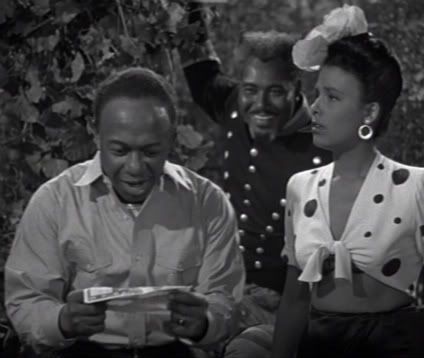 Where, in an unfortunate circumstantial twist, Little Joe's saintly wife Petunia (Ethel Waters in a megawatt performance) discovers her husband and Georgia in a basically innocent embrace, causing Petunia to expel the newly wealthy Little Joe from their humble home and into the lavish embrace of Horne's Georgia.
Where, in an unfortunate circumstantial twist, Little Joe's saintly wife Petunia (Ethel Waters in a megawatt performance) discovers her husband and Georgia in a basically innocent embrace, causing Petunia to expel the newly wealthy Little Joe from their humble home and into the lavish embrace of Horne's Georgia.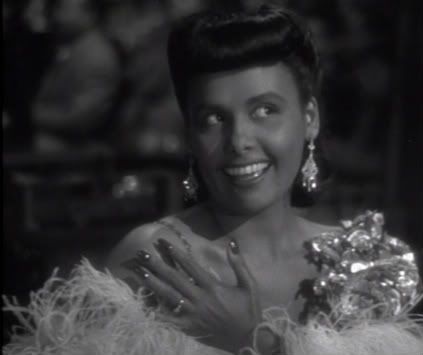 The next time we see Georgia, she's bedecked and bejeweled in a manner befitting the her status as the chosen companion of the wealthiest sport in town. During this time, Lena Horne flirts and flounces her way through the thinly scripted scenes, singing fabulously, all the while portraying Georgia as an unmalicious mercenary who might just have a real soft spot for Little Joe. And, of course, Lena Horne flashes her heartstopping smile a few times. In many ways, it's utterly unremarkable stuff -- mostly charismatic but merely competent moments from Horne, really, even during the electrifying (if brief) verbal slapdown between Waters' Petunia and Horne's Georgia. Throughout most of the film, Lena Horne delivers a memorable performance of Lena Horne-ishness, albeit under the character name of Georgia Brown. Until, that is, the character's penultimate moments, when something remarkable happens.
The next time we see Georgia, she's bedecked and bejeweled in a manner befitting the her status as the chosen companion of the wealthiest sport in town. During this time, Lena Horne flirts and flounces her way through the thinly scripted scenes, singing fabulously, all the while portraying Georgia as an unmalicious mercenary who might just have a real soft spot for Little Joe. And, of course, Lena Horne flashes her heartstopping smile a few times. In many ways, it's utterly unremarkable stuff -- mostly charismatic but merely competent moments from Horne, really, even during the electrifying (if brief) verbal slapdown between Waters' Petunia and Horne's Georgia. Throughout most of the film, Lena Horne delivers a memorable performance of Lena Horne-ishness, albeit under the character name of Georgia Brown. Until, that is, the character's penultimate moments, when something remarkable happens.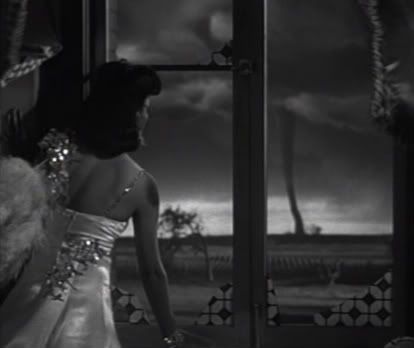 See, a tornado's readying to blast through (largely because of a repentant Petunia's heartfelt prayer) ostensibly to stop Little Joe and his rival Domino from killing one another. Horne's Georgia Brown is the sole patron to remain inside the jukejoint and witness the events as they unfold. She see's Domino inadvertantly shoot Petunia and knows what's about to happen as he trains his gun on Joe.
See, a tornado's readying to blast through (largely because of a repentant Petunia's heartfelt prayer) ostensibly to stop Little Joe and his rival Domino from killing one another. Horne's Georgia Brown is the sole patron to remain inside the jukejoint and witness the events as they unfold. She see's Domino inadvertantly shoot Petunia and knows what's about to happen as he trains his gun on Joe.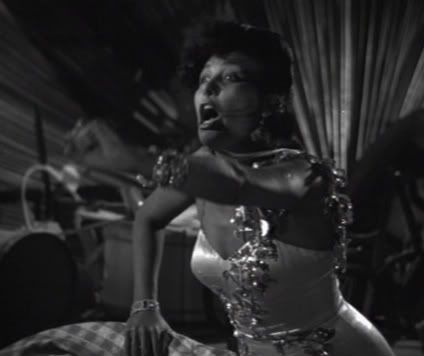 In this quick sequence of moments, Lena Horne transforms Georgia Brown from a shallow goodtime gal into a woman of palpable human feeling. Her devastated shriek, begging Domino not to shoot Joe, is galvanic, a clap of emotional thunder that amplifies the narrative intensity of this scene. Because of Georgia's reaction, we understand that this is real, that Petunia's likely already dead, with Joe almost certain to follow shortly. (And Domino to fall soon after.) Horne's Georgia Brown is left alone, staggering amidst the flying wreckage of her former life as a goodtime gal. She weaves this way and that, whether by the force of the wind or her own distracted power we aren't sure, before collapsing to the floor -- her face and arms upstretched in a gesture of supplicant surrender.
In this quick sequence of moments, Lena Horne transforms Georgia Brown from a shallow goodtime gal into a woman of palpable human feeling. Her devastated shriek, begging Domino not to shoot Joe, is galvanic, a clap of emotional thunder that amplifies the narrative intensity of this scene. Because of Georgia's reaction, we understand that this is real, that Petunia's likely already dead, with Joe almost certain to follow shortly. (And Domino to fall soon after.) Horne's Georgia Brown is left alone, staggering amidst the flying wreckage of her former life as a goodtime gal. She weaves this way and that, whether by the force of the wind or her own distracted power we aren't sure, before collapsing to the floor -- her face and arms upstretched in a gesture of supplicant surrender.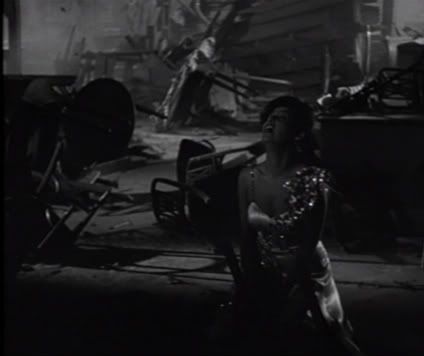 We come to learn, in the heavenly epilogue that follows, that Georgia Brown's experience in the jukejoint on the night the tornado hit brought her to the Lord and caused her to repent all her previous sins (and "what a list it was"). This plot twist is the final deux ex machina moment needed to allow this comedy to conclude with the requisite reconciliation, but there's something more in this final reference to Georgia Brown. Indeed, the transformation that Horne effects in her final onscreen moments -- when the stock character shtik goes away and something more human manifests -- undergirds the conclusion in essential, humane ways. The message is clear -- all sinners can go to heaven if they only learn to listen to the goodness in their hearts -- and, in her final moments on screen, Lena Horne helps to make such a platitude feel mighty real.
We come to learn, in the heavenly epilogue that follows, that Georgia Brown's experience in the jukejoint on the night the tornado hit brought her to the Lord and caused her to repent all her previous sins (and "what a list it was"). This plot twist is the final deux ex machina moment needed to allow this comedy to conclude with the requisite reconciliation, but there's something more in this final reference to Georgia Brown. Indeed, the transformation that Horne effects in her final onscreen moments -- when the stock character shtik goes away and something more human manifests -- undergirds the conclusion in essential, humane ways. The message is clear -- all sinners can go to heaven if they only learn to listen to the goodness in their hearts -- and, in her final moments on screen, Lena Horne helps to make such a platitude feel mighty real.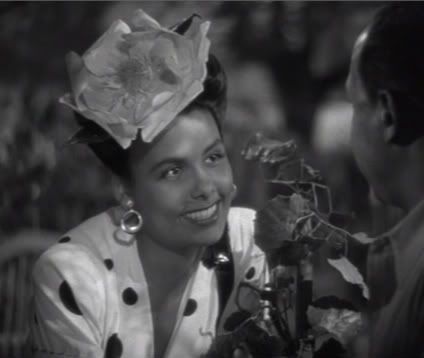 Lena Horne's performance as Georgia Brown is not an especially finely crafted performance, nor is it a formidable acting accomplishment (though as a skilled musical performance on screen it likely endures). Yet, as one of the very few roles in which MGM contract player Lena Horne was permitted to act a character (instead of just singing an assortment of easily deleted songs), the film provides an essential document of Lena Horne's (alas) untapped potential as an actress. The acting she does at the edges of the tornado sequence in Cabin in the Sky demonstrates that Miss Horne was indeed ready for her non-musical closeup, one which -- unfortunately -- never really came.
Lena Horne's performance as Georgia Brown is not an especially finely crafted performance, nor is it a formidable acting accomplishment (though as a skilled musical performance on screen it likely endures). Yet, as one of the very few roles in which MGM contract player Lena Horne was permitted to act a character (instead of just singing an assortment of easily deleted songs), the film provides an essential document of Lena Horne's (alas) untapped potential as an actress. The acting she does at the edges of the tornado sequence in Cabin in the Sky demonstrates that Miss Horne was indeed ready for her non-musical closeup, one which -- unfortunately -- never really came.
4 comments:
what a lovely write up.
i really enjoy Lena Horne (from CDs) so i was so excited to see her in this. The cut scene in the bathtub is so fun ---and that megawatt smile is amplified surrounded in bubbles.
but what you said about the last notes in her performance i agree with but it's what also made me disappointed in the 'take it back' kind of ending the film had. strange choice there.
I looooved her performance here. Was it "decent" to show bras during those years? I've been trying to remember more bras I've seen in classic movies and none come to mind.
Watching her also made me wonder whatever happened to that biopic that was supposed to star Janet Jackson? Cause in a way she's also been a bit neglected in proving her acting skills (maybe she doesn't have any, but you know what I mean).
Oh and thanks for the comment! Nothing gets me as happy as film discussion!
I completely felt that moment of the film as well, and feel that both she and Waters had a multitude that was untapped because of the time. I do love that moment, though, and it shows what's so enduring about Horne.
"They took my light Egyptian and they put it ALL OVER Ava Gardner!"
You know, I regret not participating in this, particularly because I would have looooved to write a little something-something about Butterfly McQueen's role here (which is small, but so anti-GWTW, it's delicious).
Post a Comment